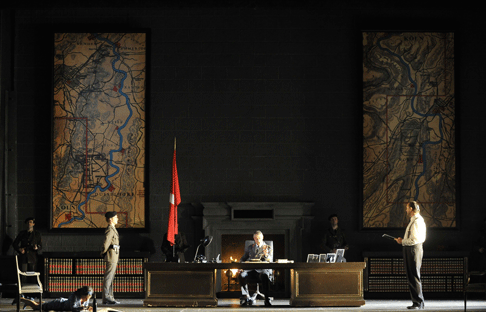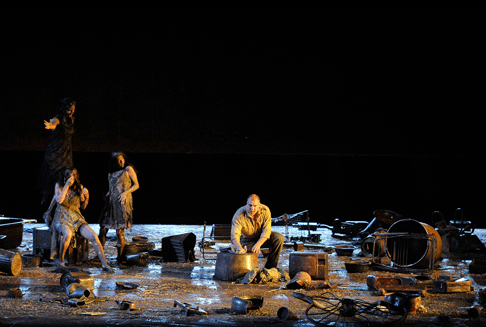Recently in Reviews
English Touring Opera are delighted to announce a season of lyric monodramas to tour nationally from October to December. The season features music for solo singer and piano by Argento, Britten, Tippett and Shostakovich with a bold and inventive approach to making opera during social distancing.
This tenth of ten Live from London concerts was in fact a recorded live performance from California. It was no less enjoyable for that, and it was also uplifting to learn that this wasn’t in fact the ‘last’ LfL event that we will be able to enjoy, courtesy of VOCES8 and their fellow vocal ensembles (more below …).
Ever since Wigmore Hall announced their superb series of autumn concerts, all streamed live and available free of charge, I’d been looking forward to this song recital by Ian Bostridge and Imogen Cooper.
The Sixteen continues its exploration of Henry Purcell’s Welcome Songs for Charles II. As with Robert King’s pioneering Purcell series begun over thirty years ago for Hyperion, Harry Christophers is recording two Welcome Songs per disc.
Although Stile Antico’s programme article for their Live from London recital introduced their selection from the many treasures of the English Renaissance in the context of the theological debates and upheavals of the Tudor and Elizabethan years, their performance was more evocative of private chamber music than of public liturgy.
In February this year, Albanian soprano Ermonela Jaho made a highly lauded debut recital at Wigmore Hall - a concert which both celebrated Opera Rara’s 50th anniversary and honoured the career of the Italian soprano Rosina Storchio (1872-1945), the star of verismo who created the title roles in Leoncavallo’s La bohème and Zazà, Mascagni’s Lodoletta and Puccini’s Madama Butterfly.
Evidently, face masks don’t stifle appreciative “Bravo!”s. And, reducing audience numbers doesn’t lower the volume of such acclamations. For, the audience at Wigmore Hall gave soprano Elizabeth Llewellyn and pianist Simon Lepper a greatly deserved warm reception and hearty response following this lunchtime recital of late-Romantic song.
Collapsology. Or, perhaps we should use the French word ‘Collapsologie’ because this is a transdisciplinary idea pretty much advocated by a series of French theorists - and apparently, mostly French theorists. It in essence focuses on the imminent collapse of modern society and all its layers - a series of escalating crises on a global scale: environmental, economic, geopolitical, governmental; the list is extensive.
For this week’s Live from London vocal recital we moved from the home of VOCES8, St Anne and St Agnes in the City of London, to Kings Place, where The Sixteen - who have been associate artists at the venue for some time - presented a programme of music and words bound together by the theme of ‘reflection’.
'Such is your divine Disposation that both you excellently understand, and royally entertaine the Exercise of Musicke.’
Amongst an avalanche of new Mahler recordings appearing at the moment (Das Lied von der Erde seems to be the most favoured, with three) this 1991 Mahler Second from the 2nd Kassel MahlerFest is one of the more interesting releases.
‘And there was war in heaven: Michael and his angels fought against the dragon; and the dragon fought and his angels, And prevailed not; neither was their place found any more in heaven … that old serpent … Satan, which deceiveth the whole world: he was cast out into the earth, and his angels were cast out with him.’
If there is one myth, it seems believed by some people today, that probably needs shattering it is that post-war recordings or performances of Wagner operas were always of exceptional quality. This 1949 Hamburg Tristan und Isolde is one of those recordings - though quite who is to blame for its many problems takes quite some unearthing.
There was never any doubt that the fifth of the twelve Met Stars Live in Concert broadcasts was going to be a palpably intense and vivid event, as well as a musically stunning and theatrically enervating experience.
‘Love’ was the theme for this Live from London performance by Apollo5. Given the complexity and diversity of that human emotion, and Apollo5’s reputation for versatility and diverse repertoire, ranging from Renaissance choral music to jazz, from contemporary classical works to popular song, it was no surprise that their programme spanned 500 years and several musical styles.
The Academy of St Martin in the Fields have titled their autumn series of eight concerts - which are taking place at 5pm and 7.30pm on two Saturdays each month at their home venue in Trafalgar Square, and being filmed for streaming the following Thursday - ‘re:connect’.
The London Symphony Orchestra opened their Autumn 2020 season with a homage to Oliver Knussen, who died at the age of 66 in July 2018. The programme traced a national musical lineage through the twentieth century, from Britten to Knussen, on to Mark-Anthony Turnage, and entwining the LSO and Rattle too.
With the Live from London digital vocal festival entering the second half of the series, the festival’s host, VOCES8, returned to their home at St Annes and St Agnes in the City of London to present a sequence of ‘Choral Dances’ - vocal music inspired by dance, embracing diverse genres from the Renaissance madrigal to swing jazz.
Just a few unison string wriggles from the opening of Mozart’s overture to Le nozze di Figaro are enough to make any opera-lover perch on the edge of their seat, in excited anticipation of the drama in music to come, so there could be no other curtain-raiser for this Gala Concert at the Royal Opera House, the latest instalment from ‘their House’ to ‘our houses’.
"Before the ending of the day, creator of all things, we pray that, with your accustomed mercy, you may watch over us."
Reviews
![Jayne Casselman as Brünnhilde [Photo courtesy of Teatro La Fenice]](http://www.operatoday.com/Gotterdammerung_Fenice_02.gif)
26 Jun 2009
Gőtterdämmerung in Venice and Kőln — Sex and Politics Behind the Berlin Wall
With Götterdämmerung, a co-production with the Köln Opera House created by Robert Carsen (stage direction), Patrick Kinmonth (sets and costumes) and
Jeffrey Tate (conductor), La Fenice approaches completion of the
Ring cycle.
La Fenice’s Ring, however, will not be
completed until next season because of complicated programming and budgeting
considerations. Consequently, the prologue, Das Rheingold, will be
seen in the lagoon after the downfall of the Gods and of the Gibichungs’
Kingdom. Moreover, although the Carsen-Kinmonth-Tate team remained unchanged,
many cast changes were made at La Fenice along with a revamping of the sets to
fit its smaller stage.
Chronologically, the Köln-La Fenice Ring is one of the first
to be staged in the 21st century. Its concepts are similar to those of the
“politically oriented” Rings that prevailed from the
mid-70s to the mid-80s, especially in Europe. This first of these
“politically oriented” Rings was the (nearly aborted) La
Scala production created by Luca Ronconi (stage direction) and the Pierluigi
Pizzi (sets and costumes) in 1974. The musical director, Wolfang Sawallisch,
objected to proceeding beyond Die Walküre. The entire project was revived
in Florence (with Zubin Mehta in the pit) in 1979-82. The most widely known of
the “politically oriented” Rings was the Bayreuth
“Centenary” production in 1976 entrusted to Patrice Chéreau and
Pierre Boulez. After four years in the “Holy Hill”, it became a
successful television serial that was also shown in regular movie houses. Now
whilst only photographs remain of the Florence production, the Chéreau-Boulez
Ring is available on DVD. It is fair to say that the saga lends itself
to a political allegory of industrial and political power, of lust for money
and for women, of Nazism’s rise and fall, a direction taken by Luchino
Visconti in his 1971 blockbuster film.
In light of this context, there is something old fashioned in the La Fenice-Köln production. Nevertheless, the Ghibichung Kingdom is not Hitler’s
Reich, but rather East Germany before the fall of the Berlin Wall. Red flags
are flying about the Royal Palace. The “nomenklatura” are dressed
in elegant attire of the '50s, accompanied by soldiers of the National
Peoples’ Army. Siegfried, Brünnhilde and the Norns, on the other hand,
are shabbily dressed. The Norns live in an attic filled with broken
furniture from the 1930s and the 1940s (an allusion to the defunct
bourgeoisie?).
Albeit attractive, the Rhinemaidens appear poverty-striken,
swimming in a polluted Rhine. As in many of Carsen’s production, politics
is mixed with a fair amount of sex. At daybreak, Brünnhilde begins her
passionate love duet by performing oral sex upon Siegfried. Hagen makes love to
Gutrune on Gunther’s royal desk (in the presence of her brother and
King). In the wife-swapping scene at the end of the first act, Siegfried
(disguised as Gunther) attempts to rape Brünnhilde before remembering his pact
with the King. The second-act wedding party initially appears as an orgy with
rivers of wine and spirits and ladies taking off their clothes.

In a similar
vein, the Rheinmaidens grope Siegfried all about his trousers. All of this heightens the coup-de-théâtre in the final scene. Brünnhilde is alone
on stage during the holocaust, the fire of the Royal Palace, the downfall of
the Gods and the flood of the river (cleansing corrupted Gods and corrupted
men-in-power). During the concluding passages, a huge waterfall covers the
stage. In short, although the concept goes back to the 70s, there are numerous
innovations in this Ring and this Götterdämmerung in
particular.

Although British, Jeffrey Tate possesses an Italian or Austrian conducting
style. He caresses the orchestra with gently slowing tempi. This clashes,
however, with the dramatic action-oriented stage direction. La Fenice’s
orchestra fares well; but it is not that of the Maggio Musicale Fiorentino
(which performed Götterdämmerung a few weeks ago) or of the Berliner
Philarmoniker (which will perform Götterdämmerung in Aix en Provence
in early July). Jayne Casselman was simply excellent, both vocally and
dramatically, as a vibrant Brünnhilde to be remembered for some time. Her
Siegfried, Stefan Vinke, performed well in the taxing third act; but in the
previous two acts he displayed vocal problems (especially with the Cs) and a
host of technical difficulties. He paled against Lance Taylor who performed the
role in the recent Florence production. A sexy Nicola Beller Carbone was a
vocally imposing Gutrune. And, the youthful Gabriel Suovane and Gidon Saks were
two well-rounded bass baritones, whom, I trust, we will hear often in the
future.
Giuseppe Pennisi
![Jayne Casselman as Brünnhilde [Photo courtesy of Teatro La Fenice]](http://www.operatoday.com/Gotterdammerung_Fenice_02.gif)

